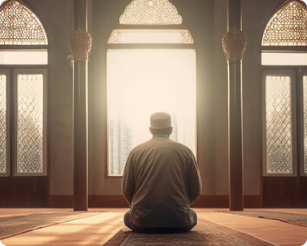Supplication is an act of worship in itself and has a direct impact on the belief, thoughts and behavior of the supplicant, in addition to its religious impact or response. Because every act of worship also has psychological effects on the servant, prayer, which is the most important and greatest personal and collective act of worship, can also have this direct and great psychological and social impact.
To study the psychological effects, prayer must be viewed as a body language, and body languages, just as they have a psychological connotation from which one can infer a person's personal characteristics, they also have an impact on a person's behavior, thoughts, beliefs and moods sometimes. The first part is well-known and understood; hand movements during conversation, the way one sits, the sleeping position, facial expressions and even silence have a psychological connotation, and perhaps understanding these connotations can rise to the level of an independent science in itself.
There is no doubt that the presence of an imam for prayer reminds us that we are a disciplined nation that should not be without a leader, and that we are like the teeth of a comb, with no difference between Arabs and non-Arabs, an organized nation that gathers in love to remember God, and does not disperse except for Him.
The second part, which is the effect of physical movements on a person's psychological and emotional state, can be understood from many scenes in daily life; for example, no one can deny the effect of practicing sports such as running, for example, on the psychological state, and we may find someone who seeks tranquility in practicing yoga, and such indications have been mentioned in the Sunnah; for example, the Messenger of Allah, may Allah bless him and grant him peace, advised the angry person to change his physical appearance; if he was standing, he should sit down, as he said: "If one of you becomes angry while standing, he should sit down; if the anger goes away, then he should lie down."
Because the body position has an effect on the psychological state; also, the sitting positions that the Messenger of Allah, may Allah bless him and grant him peace, disliked express in general leaning with arrogance, as such leaning develops arrogance in a person; therefore, there is a dialectical relationship between body movements and the psychological state of a person at various levels. So, does prayer, as physical movements, have a psychological effect and significance on the individual and society? The answer to this question comes when we contemplate the language of the body during prayer.
First, prayer is a relationship between the servant and his Lord. You must first leave the world behind you and turn to Allah with your heart. This is clear in the first movements of prayer, which is the Takbir al-Ihram. It is raising the hand upwards from the inside out as if you are throwing your worldly thoughts behind your back, then you turn to Allah by moving the hands inwards as if you are turning to Allah. As is known, the movement of the body from the inside out means rejection and abandonment. When you signal to someone to move away, you signal to him with your hand in this direction and vice versa. The movement of the body from the outside to the inside, which is the second part of the Takbir al-Ihram, expresses acceptance and approval. The second movement in prayer is bowing, followed by prostration. These are also movements of acceptance and approval. They are the bending of the body inwards and then standing to prepare for the complete bending of the body on itself (the position of prostration); to express complete approval of Allah. This is why the Messenger, may Allah bless him and grant him peace, informed us that the servant is closest to his Lord when he is prostrating.

